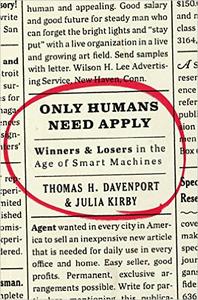 Zusammenfassungen
Zusammenfassungen
 An invigorating, thought-provoking, and positive look at the rise of automation that explores how professionals across industries can find sustainable careers in the near future.
An invigorating, thought-provoking, and positive look at the rise of automation that explores how professionals across industries can find sustainable careers in the near future.
Nearly half of all working Americans could risk losing their jobs because of technology. It’s not only blue-collar jobs at stake. Millions of educated knowledge workers—writers, paralegals, assistants, medical technicians—are threatened by accelerating advances in artificial intelligence.
The industrial revolution shifted workers from farms to factories. In the first era of automation, machines relieved humans of manually exhausting work. Today, Era Two of automation continues to wash across the entire services-based economy that has replaced jobs in agriculture and manufacturing. Era Three, and the rise of AI, is dawning. Smart computers are demonstrating they are capable of making better decisions than humans. Brilliant technologies can now decide, learn, predict, and even comprehend much faster and more accurately than the human brain, and their progress is accelerating. Where will this leave lawyers, nurses, teachers, and editors?
In Only Humans Need Apply, Thomas Hayes Davenport and Julia Kirby reframe the conversation about automation, arguing that the future of increased productivity and business success isn’t either human or machine. It’s both. The key is augmentation, utilizing technology to help humans work better, smarter, and faster. Instead of viewing these machines as competitive interlopers, we can see them as partners and collaborators in creative problem solving as we move into the next era. The choice is ours.
 Dieses Buch erwähnt ...
Dieses Buch erwähnt ...
 Dieses Buch erwähnt vermutlich nicht ...
Dieses Buch erwähnt vermutlich nicht ... 
 Nicht erwähnte Begriffe | Aktivitätstracker, Bildung, Chat-GPT, Coursera, Digitalisierung, edX, GMLS & Bildung, Intelligenz, Kinder, LehrerIn, Unterricht |
 Tagcloud
Tagcloud
 Zitationsgraph
Zitationsgraph
 Zitationsgraph (Beta-Test mit vis.js)
Zitationsgraph (Beta-Test mit vis.js)
 Zeitleiste
Zeitleiste
 3 Erwähnungen
3 Erwähnungen 
- Technology-related knowledge, skills, and attitudes of pre- and in-service teachers (Sabine Seufert, Josef Guggemos, Michael Sailer) (2021)
- Technology-related knowledge, skills, and attitudes of pre- and in-service teachers - The current situation and emerging trends


- Technology-related knowledge, skills, and attitudes of pre- and in-service teachers - The current situation and emerging trends
- Digital Leadership - Schulen im digitalen Wandel führen (Tobias Röhl, Johannes Breitschaft, Eliane Burri, Nicole Wespi) (2023)


- Künstliche Intelligenz in der Bildung (Claudia de Witt, Christina Gloerfeld, Silke Elisabeth Wrede) (2023)


- Fortgeschrittene Digitalisierung und Strategien für die berufliche (Weiter-)Bildung - Augmentation, Fusion Skills und Augmentationsstrategien (Sabine Seufert, Christoph Meier)


- Fortgeschrittene Digitalisierung und Strategien für die berufliche (Weiter-)Bildung - Augmentation, Fusion Skills und Augmentationsstrategien (Sabine Seufert, Christoph Meier)
 Co-zitierte Bücher
Co-zitierte Bücher

Work, Progress, and Prosperity in a Time of Brilliant Technologies
(Erik Brynjolfsson, Andrew McAfee) (2014)

 Volltext dieses Dokuments
Volltext dieses Dokuments
 Bibliographisches
Bibliographisches 
 Beat und dieses Buch
Beat und dieses Buch
Beat hat dieses Buch während seiner Zeit am Institut für Medien und Schule (IMS) ins Biblionetz aufgenommen. Beat besitzt kein physisches, aber ein digitales Exemplar. (das er aber aus Urheberrechtsgründen nicht einfach weitergeben darf). Es gibt bisher nur wenige Objekte im Biblionetz, die dieses Werk zitieren.










 Algorithmus
Algorithmus Arbeitslosigkeit
Arbeitslosigkeit China
China Computer
Computer Denken
Denken design thinking
design thinking Generative Machine-Learning-Systeme (GMLS)
Generative Machine-Learning-Systeme (GMLS) Gesellschaft
Gesellschaft Gesichtserkennung
Gesichtserkennung Internet
Internet Internet der Dinge
Internet der Dinge knowledge worker
knowledge worker Künstliche Intelligenz (KI / AI)
Künstliche Intelligenz (KI / AI) Lernen
Lernen Long Tail
Long Tail machine learning
machine learning Management
Management Maschine
Maschine Problemlösefähigkeit
Problemlösefähigkeit Produktivität
Produktivität Programmieren
Programmieren Psychologie
Psychologie quantified self
quantified self Roboter
Roboter Schule
Schule USA
USA












 Biblionetz-History
Biblionetz-History